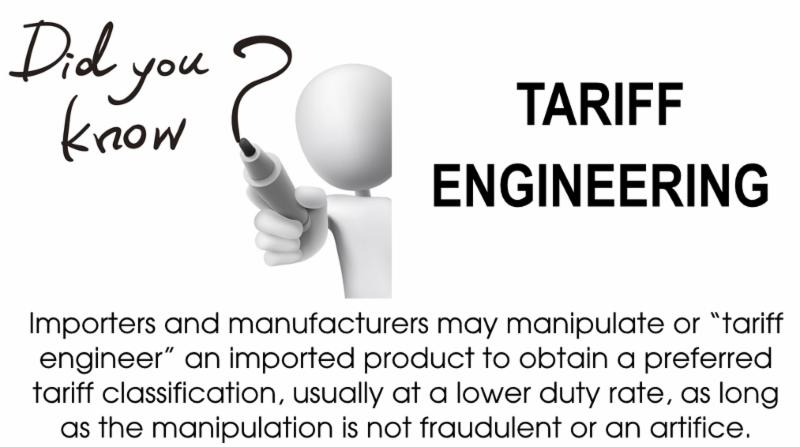 Did you know that under federal law, CBP must give reasonable notice if it wants to examine any records? See 19 USC §1509. Did you know that under federal regulations, CBP must give 30 days' written notice and that CBP can give less than 30 days' written notice only if the entry records are required in connection with a determination regarding the admissibility or release of merchandise? Did you know that under federal regulations, CBP is allowed to verbally request entry records, but that any such demand shall be followed by a written or electronic demand? See 19 CFR § 163.6.
1 Comment
 Excuse the violent metaphor in this article's title, but the Super Bowl just ended and my head still reverberates with all the sounds and grotesque images from the game. You know, concussions, broken wrists, Beast Mode, deflated footballs, and, worst of all, stale guacamole. Over the past few decades, our courts and legislative bodies have fortified intellectual property rights in a myriad of ways, including at the border. However, there is one notable exception: gray market goods. Gray market goods or parallel imports are imported products bought legitimately in another country on the cheap and then imported into the USA for sale. Manufacturers do not like how gray market goods disrupt and undercut their domestic distribution arrangements. Gray market goods are not knockoffs. We are not talking about piratical products. Gray market goods are genuine. Which begs the question: if a manufacturer loses all proprietary interests when it sells its goods (because someone else now owns them), how can the manufacturer dictate what happens to those goods thereafter? Does the law provide an invisible tether to yank goods back into the manufacturer's lap? Well, sort of. At least it did until two years ago when the U.S. Supreme Court suddenly realized that, hey, this kind of restriction contravenes the "I bought it, it's mine to do with as I wish" precept that all of us grew up to expect and that powers our economy and disposable culture. The case was Kirtsaeng v. John Wiley & Sons, and the U.S. Supreme Court decided that copyright law cannot be used to ban imported goods after the first sale. US Customs and Border Protection still has regulations to keep gray market goods out. Whether the agency continues to enforce those regulations is not clear, but manufacturers are trying to find a way around Kirtsaeng. With little luck. The Ninth Circuit Court of Appeals, one level down from the U.S. Supreme Court, just decided Omega v. Costco. Isn't that a wonderfully comic book-like title for a court case? You almost expect Thor and Iron Man to represent opposing sides. The Omega in this case was the manufacturer of luxury watches. Costco is where you likely bought the guacamole that I mentioned earlier. It seems that Costco purchased 117 Omega watches on the gray market and then had the audacity to import and offer them for sale at their stores at a tempting discount, all without first getting Omega's ok, not that an ok would ever have come. The court dispensed with Omega's challenge, citing to Kirtsaeng: "Thus, application of the first sale doctrine disposes of Omega's claim, resolves this case in Costco's favor, and conclusively reaffirms that copyright holders cannot use their rights to fix resale prices in the downstream market." Gray market earns another nail in the coffin. Now I'm mixing my metaphors. Must be the stale guacamole. I cannot proclaim with complete certainty that gray market is dead. Omega engraved its copyrighted design into each of the watches hoping that an infringement claim would be enough to keep the goods out of the country. The strategy didn't fly with the 9th Circuit, but we attorneys are a crafty and insistent lot, like raccoons that somehow find their way into your attic. Lawyers are busily investigating whether trademark or contract law can prop up gray market law. It's an uphill battle, like trying to turn stale guacamole back into an avocado.  PayPal has agreed, without admitting any guilt, to pay $7.6 million to the U.S. Government to settle allegations that it failed to block transactions to Cuba, Sudan, and Iran. Read the announcement here. PayPal fessed up about what it had done by filing a voluntary self-disclosure. It did not wait to be caught, which may be particularly smart for a financial institution. OFAC tends to be brutal with financial institutions that violate US sanctions laws. It is difficult to tell if OFAC went easy on PayPal. Seven million dollars for any financial institution is a drop in the bucket, especially when, as here, a company repeatedly violates sanctions laws for several years. There were 486 transactions in all! On other hand, the total money spent on these 486 transactions was just $43,934. OFAC does not reveal whether these were cash transfers or purchases of consumer products. At about $90 a pop, maybe people were just buying small kitchen appliances or cheap Broadway tickets. If so, OFAC's main gripe may have been with the intended recipients. What really ticked off OFAC was that PayPal processed 136 transactions to and from a Specially Designated National, someone on a prohibited parties list that all transactions must be screened against. That the penalty was not all it could have been is at least partially due to PayPal's cooperation with OFAC's investigation. It also helped that PayPal replaced its compliance personnel. Unfortunately, OFAC's press release does not specify whether PayPal was able to use its own services to pay the fine. One wonders if the U.S. Government was required to pay a processing fee or wait a week to receive its funds. Global climate change is devastating penguin populations just like it imperils every other living thing on our precious Earth (no need to convince Californians of this). But there is one type of penguin that is immune to humankind's depredations. Indeed, this penguin, which reveals its visage (or is it "plummage?") only in the winter, owes its very existence to the consumerism that lays waste to the environment. I refer, of course, to the beaded penguin or, as CBP now calls it, the lighted penguin sculpture. I was once like you, dear reader, ignorant of anything to do with this rare, shining breed. Not until I sat down to write this article had I ever even heard of the species, but then I came upon this notification that CBP was considering revoking its previous tariff classification of beaded penguins. My imagination took flight (with due respect to the flightless birds that are the topic of this article) and I was compelled to try to find out what a beaded penguin looks like. I came across several variations, all pictured below. Perhaps none of are the same penguin in CBP's revocation notice. Still, one can only hope. Maybe the lessons are that we are all just tiny penguins beaming with an inner glow that only quickly depleting fossil fuels can generate and that we are all subject to the vicissitudes of that mercurial agency known as CBP.
 Most lawsuits involving international trade wind up in federal district court, but before the merits can be heard and to avoid dismissal, the plaintiff must establish that jurisdiction is proper. Here are two recent court cases that demonstrate how this issue can be played out. What steps must a foreign company take to sue a domestic company in the USA in a contractual dispute over the sale of goods? The court In D&G v. H.A. Import (United States District Court, S.D. New York, Feb 18, 2015) outlined the jurisdictional requirements under diversity for the foreign party to sustain a lawsuit in federal district court. Diversity is the power that a federal district court has to hear a civil matter between parties from different states or between a US person/entity and a foreign person/entity. The defendant, a California resident, ordered food products from the plaintiff, an Italian company. The Italian company delivered the food products but the California defendant only made a single partial payment and still owed over $96,000. The Italian company sued the California defendant in federal district court in New York. The California defendant argued that the lawsuit should be dismissed because the Italian plaintiff inflated its damages to meet the $75,000 threshold required under diversity. The court disagreed. The court reasoned that the Italian plaintiff successfully achieved complete diversity by having one party from Italy and the other from California and by pleading an amount in controversy that exceeded the $75,000 threshold. The court said that even without diversity, the Italian plaintiff could still sue under the court's treaty jurisdiction because the lawsuit involved the United Nations Convention on Contracts for the International Sale of Goods. The court noted that it also had supplemental jurisdiction because the Plaintiff sued under state contract law. What is fascinating, and is not discussed in the court's opinion, is that the Italian plaintiff sued in federal district court in New York. Neither of the parties is from New York and none of underlying activity or contacts seems to have happened in that state. It appears that the Italian plaintiff did some forum shopping that neither the court nor the California defendant seemed to mind. But not all federal courts are so generous. In Simmtech v. Citibank Korea (U.S. D New York, Feb 20, 2015), Simmtech, a Korean exporter sued Citibank Korea over investment transactions gone sour. Simmtech brought its lawsuit in federal district court in New York. Simmtech had already tried suing in Korea, but the Korean court dismissed finding the lawsuit to be "unfounded." Citibank Korea moved to dismiss the New York lawsuit, and the court agreed. The court based its reasoning on forum non conveniens, which means what it is sounds like and is based on convenience of the parties and of the court. In this particular lawsuit, the court distinguished between forum shopping and convenience. Under the court's logic, a foreign party should not sue in a federal district court purely to gain a tactical advantage in litigation, for example, because the damages are higher or discovery is easier. The court jurisdiction is proper if there is a practical reason based on convenience to the parties. If not, dismissal is in order if there is a court somewhere else that can more practically entertain the lawsuit. The court dismissed the lawsuit because Simmtech knew any judgment from a New York court would be more generous than a Korean court and because of the expense and effort to transport witnesses from Korea to New York. Forum non conveniens may be the fuzziest weapon that judges use to avoid hearing a case. It requires judges to undertake an "on this hand, but on the other hand" balancing that cannot be quantified or second guessed and that frowns upon lawyers doing what they do best, i.e., take every tactical advantage allowed under the law. |
Oscar Gonzalez
Principal and a founding member of GRVR Attorneys. Archives
September 2016
Categories
All
|
- Home
- Who we are
-
Our Practice
- Customs and Import
- 301refunds
- Export
- Litigation
- Section 232 and 301 Tariffs
- Outsource Your Classification
- CBP Audits
- Fines, Penalties, Forfeitures, and Seizures
- Customs Brokers
- C-TPAT >
- Foreign-Trade Zones
- Antidumping and Countervailing Duties
- Intellectual Property RIghts
- Foreign Corrupt Practices Act
- Manifest Confidentiality
- Contracts and Incoterms
- False Claims Act and Whistleblower
- Blog
- Resources
- Calendar and Events
- Best Customs Broker Exam Course
- Contact


 RSS Feed
RSS Feed
